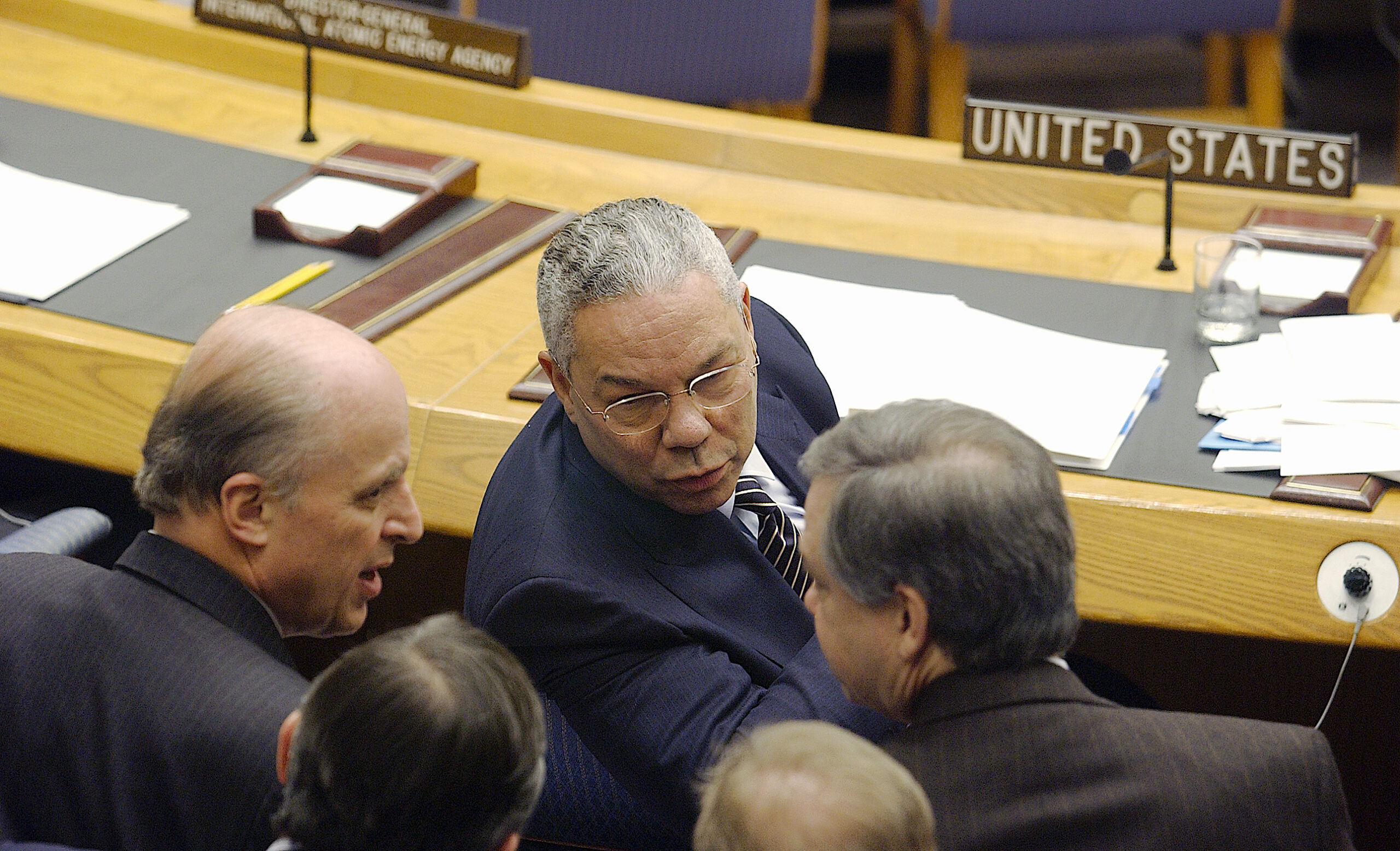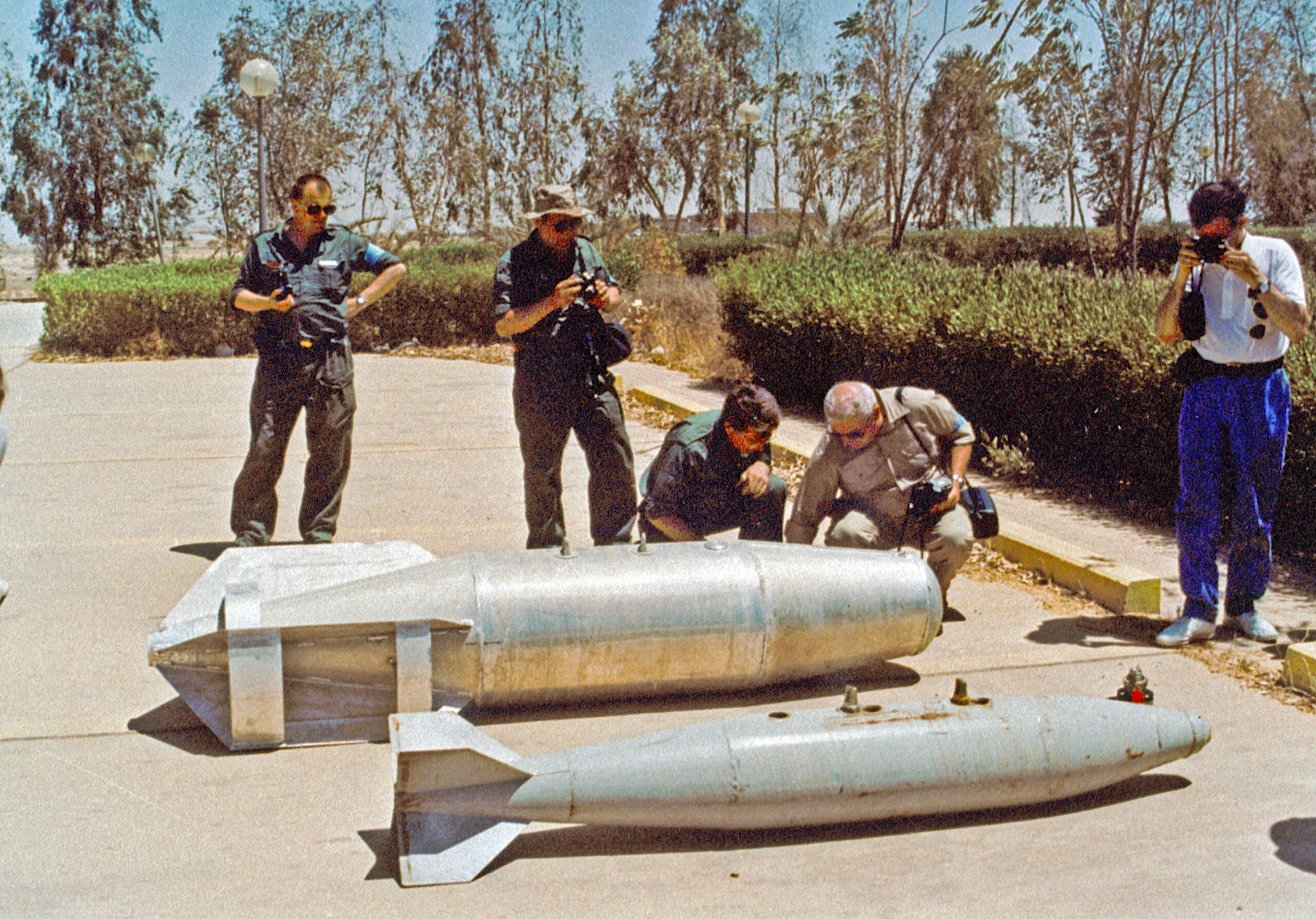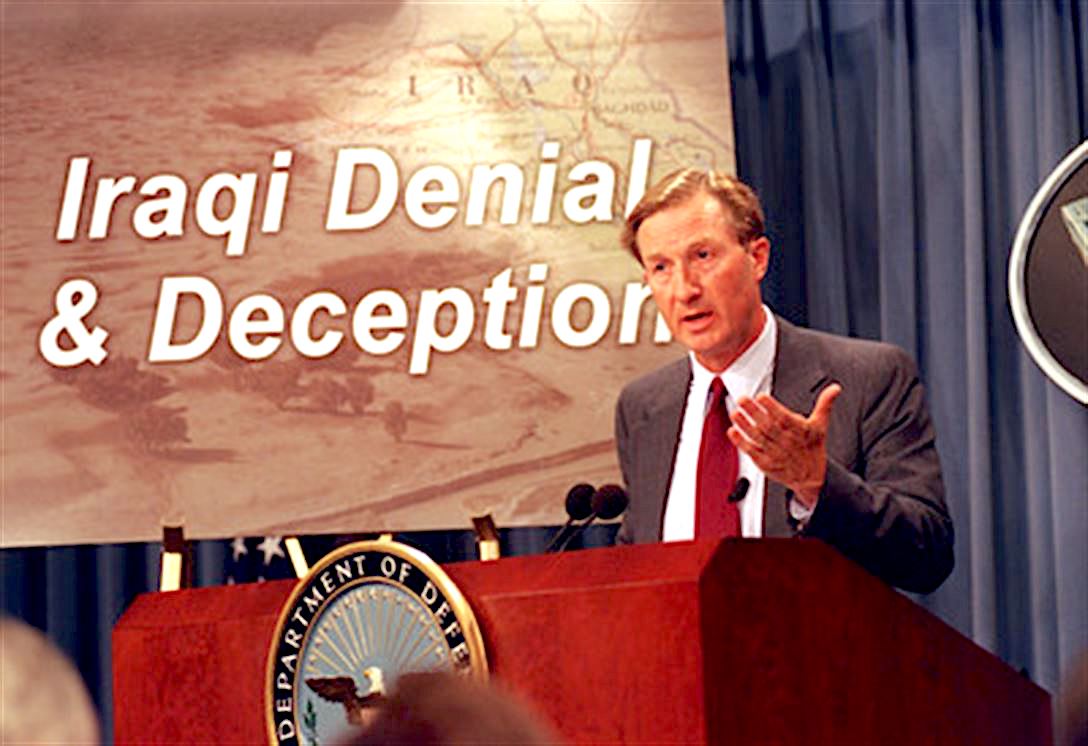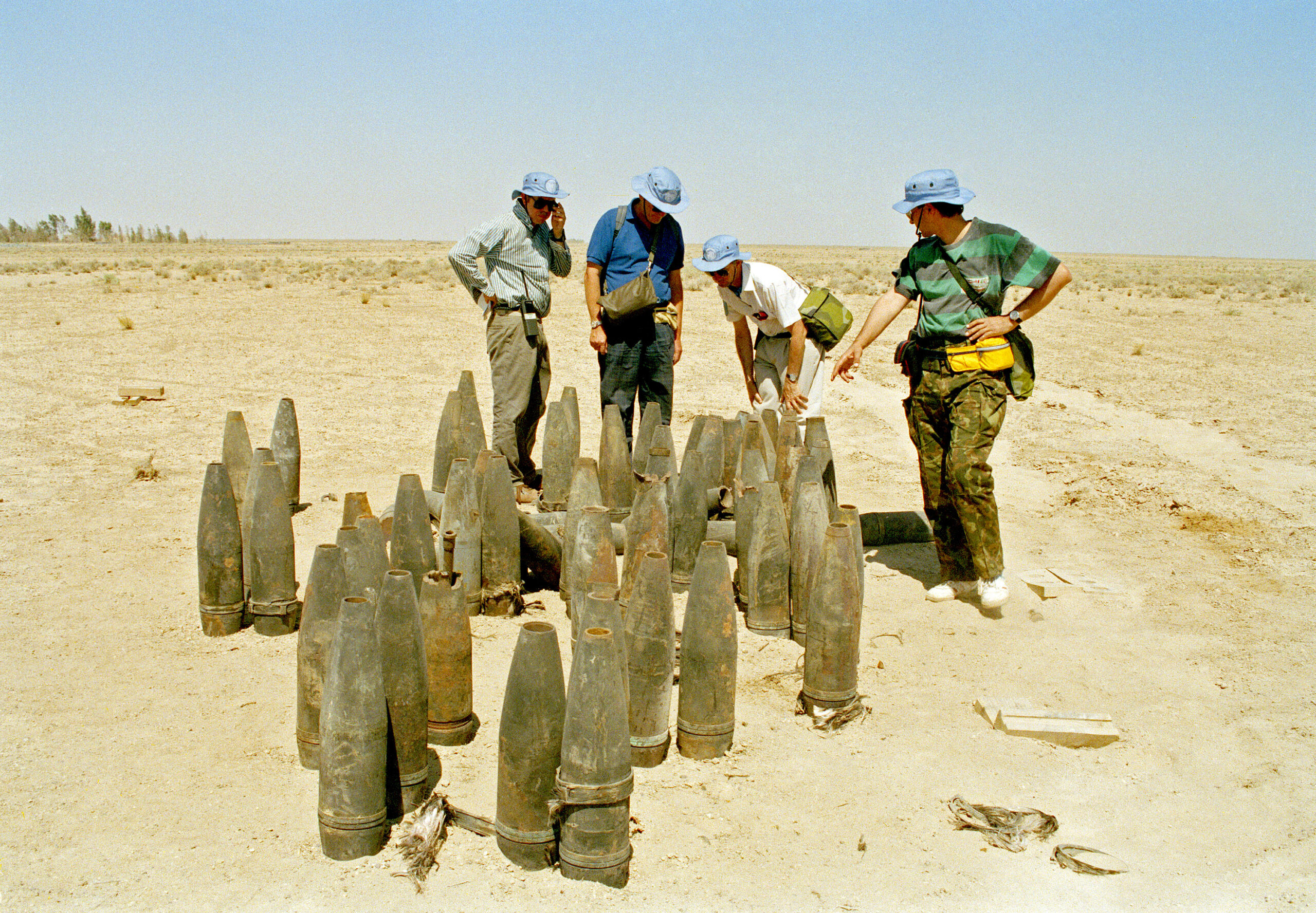
SCOTT RITTER: Powell & Iraq—Regime Change, Not Disarmament: The Fundamental Lie
Regime change, not disarmament, was always the driving factor behind U.S. policy towards Saddam Hussein. Powell knew this because he helped craft the original policy.
Special to Consortium News
 The New York Times Magazine has published a puff piece soft-peddling former Secretary of State Colin Powell’s role in selling a war on Iraq to the UN Security Council using what turned out to be bad intelligence. “Colin Powell Still Wants Answers” is the title of the article, written by Robert Draper. “The analysts who provided the intelligence,” a sub-header to the article declares, “now say it was doubted inside the CIA at the time.”
The New York Times Magazine has published a puff piece soft-peddling former Secretary of State Colin Powell’s role in selling a war on Iraq to the UN Security Council using what turned out to be bad intelligence. “Colin Powell Still Wants Answers” is the title of the article, written by Robert Draper. “The analysts who provided the intelligence,” a sub-header to the article declares, “now say it was doubted inside the CIA at the time.”
Draper’s article is an extract from a book, To Start a War: How the Bush Administration Took America into Iraq, scheduled for publication later this month. In the interest of full disclosure, I was approached by Draper in 2018 about his interest in writing this book, and I agreed to be interviewed as part of his research. I have not yet read the book, but can note that, based upon the tone and content of his New York Times Magazine article, my words apparently carried little weight.
Regime Change, Not WMD
I spent some time articulating to Draper my contention that the issue with Saddam Hussein’s Iraq was never about weapons of mass destruction (WMD), but rather regime change, and that everything had to be viewed in the light of this reality—including Powell’s Feb. 5, 2003 presentation before the UN Security Council. Based upon the content of his article, I might as well have been talking to a brick wall.
Powell’s 2003 presentation before the council did not take place in a policy vacuum. In many ways, the March 2003 U.S.-led invasion and subsequent occupation of Iraq was a continuation of the 1991 Gulf War, which Powell helped orchestrate. Its fumbled aftermath was again, something that transpired on Powell’s watch as the chairman of the Joint Chiefs of Staff in the administration of George H. W. Bush.
Powell at UN Security Council. (UN Photo)
Powell was part of the policy team that crafted the post-Gulf War response to the fact that Iraq’s president, Saddam Hussein, survived a conflict he was not meant to. After being labeled the Middle East equivalent of Adolf Hitler whose crimes required Nuremburg-like retribution in a speech delivered by President Bush in October 1990, the Iraqi President’s post-conflict hold on power had become a political problem for Bush 41.
Powell was aware of the CIA’s post-war assessment on the vulnerability of Saddam’s rule to continued economic sanctions, and helped craft the policy that led to the passage of Security Council resolution 687 in April 1991. That linked Iraq’s obligation to be disarmed of its WMD prior to any lifting of sanctions and the reality that it was U.S. policy not to lift these sanctions, regardless of Iraq’s disarmament status, until which time Saddam was removed from power.
Regime change, not disarmament, was always the driving factor behind U.S. policy towards Saddam Hussein’s Iraq. Powell knew this because he helped craft the original policy.
I bore witness to the reality of this policy as a weapons inspector working for the United Nations Special Commission (UNSCOM), created under the mandate of resolution 687 to oversee the disarming of Iraq’s WMD. Brought in to create an intelligence capability for the inspection team, my remit soon expanded to operations and, more specifically, how Iraq was hiding retained weapons and capability from the inspectors.
SCUDS
UN weapons inspectors in central Iraq, June 1, 1991. (UN Photo)
One of my first tasks was addressing discrepancies in Iraq’s accounting of its modified SCUD missile arsenal; in December 1991 I wrote an assessment that Iraq was likely retaining approximately 100 missiles. By March 1992 Iraq, under pressure, admitted it had retained a force of 89 missiles (that number later grew to 97).
After extensive investigations, I was able to corroborate the Iraqi declarations, and in November 1992 issued an assessment that UNSCOM could account for the totality of Iraq’s SCUD missile force. This, of course, was an unacceptable conclusion, given that a compliant Iraq meant sanctions would need to be lifted and Saddam would survive.
The U.S. intelligence community rejected my findings without providing any fact-based evidence to refute it, and the CIA later briefed the Senate that it assessed Iraq to be retaining a force of some 200 covert SCUD missiles. This all took place under Powell’s watch as chairman of the Joint Chiefs.
I challenged the CIA’s assessment, and organized the largest, most complex inspection in UNSCOM’s history to investigate the intelligence behind the 200-missile assessment. In the end, the intelligence was shown to be wrong, and in November 1993 I briefed the CIA Director’s senior staff on UNSCOM’s conclusion that all SCUD missiles were accounted for.
Moving the Goalposts
The CIA’s response was to assert that Iraq had a force of 12-20 covert SCUD missiles, and that this number would never change, regardless of what UNSCOM did. This same assessment was in play at the time of Powell’s Security Council presentation, a blatant lie born of the willful manufacture of lies by an entity—the CIA—whose task was regime change, not disarmament.
Powell knew all of this, and yet he still delivered his speech to the UN Security Council.
In October 2002, in a briefing designed to undermine the credibility of UN inspectors preparing to return to Iraq, the Defense Intelligence Agency trotted out Dr. John Yurechko, the defense intelligence officer for information operations and denial and deception, to provide a briefing detailing U.S. claims that Iraq was engaged in a systematic process of concealment regarding its WMD programs.
John Yurechko, of the Defense Intelligence Agency, briefs reporters at the Pentagon on Oct. 8, 2002 (U.S. Defense Dept.)
According to Yurechko, the briefing was compiled from several sources, including “inspector memoirs” and Iraqi defectors. The briefing was farcical, a deliberate effort to propagate misinformation by the administration of Bush 43. I know—starting in 1994, I led a concerted UNSCOM effort involving the intelligence services of eight nations to get to the bottom of Iraq’s so-called “concealment mechanism.”
Using innovative imagery intelligence techniques, defector debriefs, agent networks and communications intercepts, combined with extremely aggressive on-site inspections, I was able, by March 1998, to conclude that Iraqi concealment efforts were largely centered on protecting Saddam Hussein from assassination, and had nothing to do with hiding WMD. This, too, was an inconvenient finding, and led to the U.S. dismantling the apparatus of investigation I had so carefully assembled over the course of four years.
It was never about the WMD—Powell knew this. It was always about regime change.
Using UN as Cover for Coup Attempt
In 1991, Powell signed off on the incorporation of elite U.S. military commandos into the CIA’s Special Activities Staff for the purpose of using UNSCOM as a front to collect intelligence that could facilitate the removal of Saddam Hussein. I worked with this special cell from 1991 until 1996, on the mistaken opinion that the unique intelligence, logistics and communications capability they provided were useful to planning and executing the complex inspections I was helping lead in Iraq.
This program resulted in the failed coup attempt in June 1996 that used UNSCOM as its operational cover—the coup failed, the Special Activities Staff ceased all cooperation with UNSCOM, and we inspectors were left holding the bag. The Iraqis had every right to be concerned that UNSCOM inspections were being used to target their president because, the truth be told, they were.
Nowhere in Powell’s presentation to the Security Council, or in any of his efforts to recast that presentation as a good intention led astray by bad intelligence, does the reality of regime change factor in. Regime change was the only policy objective of three successive U.S. presidential administrations—Bush 41, Clinton, and Bush 43.
Powell was a key player in two of these. He knew. He knew about the existence of the CIA’s Iraq Operations Group. He knew of the successive string of covert “findings” issued by U.S. presidents authorizing the CIA to remove Saddam Hussein from power using lethal force. He knew that the die had been cast for war long before Bush 43 decided to engage the United Nations in the fall of 2002.
Powell Knew
Powell knew all of this, and yet he still allowed himself to be used as a front to sell this conflict to the international community, and by extension the American people, using intelligence that was demonstrably false. If, simply by drawing on my experience as an UNSCOM inspector, I knew every word he uttered before the Security Council was a lie the moment he spoke, Powell should have as well, because every aspect of my work as an UNSCOM inspector was known to, and documented by, the CIA.
It is not that I was unknown to Powell in the context of the WMD narrative. Indeed, my name came up during an interview Powell gave to Fox News on Sept. 8, 2002, when he was asked to comment on a quote from my speech to the Iraqi Parliament earlier that month in which I stated:
“The rhetoric of fear that is disseminated by my government and others has not to date been backed up by hard facts that substantiate any allegations that Iraq is today in possession of weapons of mass destruction or has links to terror groups responsible for attacking the United States. Void of such facts, all we have is speculation.”
Powell responded by declaring,
“We have facts, not speculation. Scott is certainly entitled to his opinion but I’m afraid that I would not place the security of my nation and the security of our friends in the region on that kind of an assertion by somebody who’s not in the intelligence chain any longer… If Scott is right, then why are they keeping the inspectors out? If Scott is right, why don’t they say, ‘Anytime, any place, anywhere, bring ‘em in, everybody come in—we are clean?’ The reason is they are not clean. And we have to find out what they have and what we’re going to do about it. And that’s why it’s been the policy of this government to insist that Iraq be disarmed in accordance with the terms of the relevant UN resolutions.”
UN inspectors in Iraq. (UN Photo)
Of course, in November 2002, Iraq did just what Powell said they would never do—they let the UN inspectors return without preconditions. The inspectors quickly exposed the fact that the “high quality” U.S. intelligence they had been tasked with investigating was pure bunk. Left to their own devices, the new round of UN weapons inspections would soon be able to give Iraq a clean bill of health, paving the way for the lifting of sanctions and the continued survival of Saddam Hussein.
Powell knew this was not an option. And thus he allowed himself to be used as a vehicle for disseminating more lies—lies that would take the U.S. to war, cost thousands of U.S. service members their lives, along with hundreds of thousands of Iraqis, all in the name of regime change.
Back to Robert Draper. I spent a considerable amount of time impressing upon him the reality of regime change as a policy, and the fact that the WMD disarmament issue existed for the sole purpose of facilitating regime change. Apparently, my words had little impact, as all Draper has done in his article is continue the false narrative that America went to war on the weight of false and misleading intelligence.
Draper is wrong—America went to war because it was our policy as a nation, sustained over three successive presidential administrations, to remove Saddam Hussein from power. By 2002 the WMD narrative that had been used to support and sustain this regime change policy was weakening.
Powell’s speech was a last-gasp effort to use the story of Iraqi WMD for the purpose it was always intended—to facilitate the removal of Saddam Hussein from power. In this light, Colin Powell’s speech was one of the greatest successes in CIA history. That is not the story, however, Draper chose to tell, and the world is worse off for that failed opportunity.
Scott Ritter is a former Marine Corps intelligence officer who served in the former Soviet Union implementing arms control treaties, in the Persian Gulf during Operation Desert Storm, and in Iraq overseeing the disarmament of WMD.
The views expressed are solely those of the author and may or may not reflect those of Consortium News.




Geen opmerkingen:
Een reactie posten
Opmerking: Alleen leden van deze blog kunnen een reactie posten.